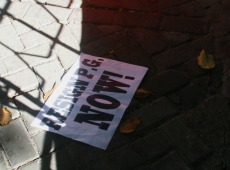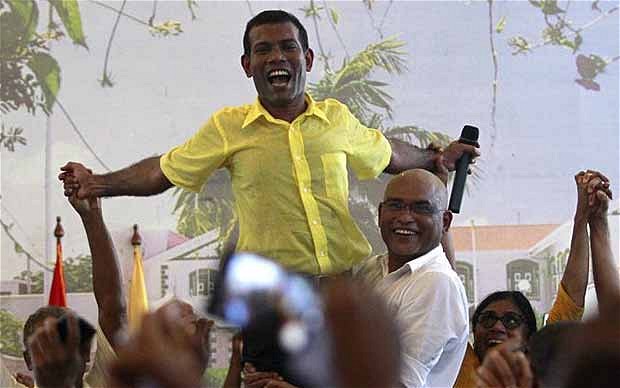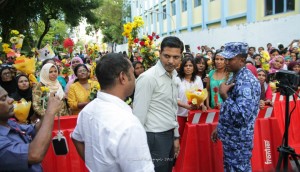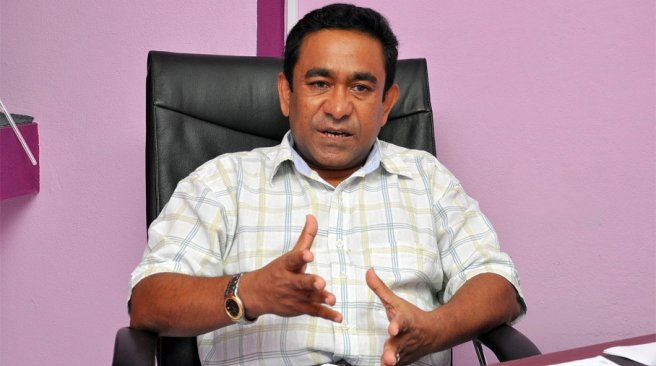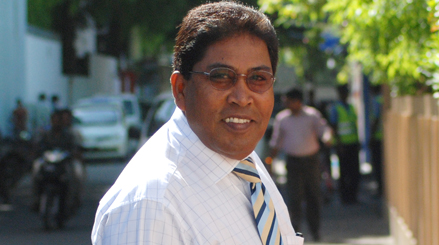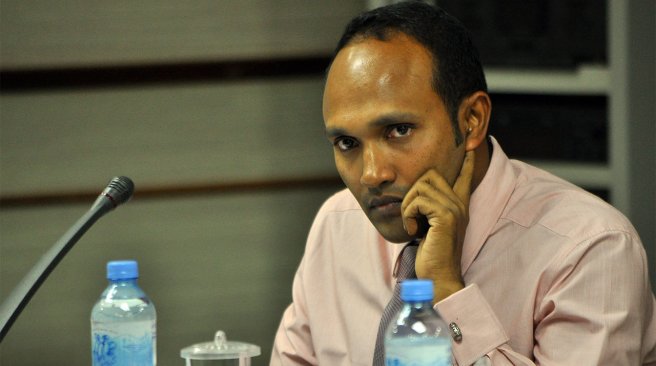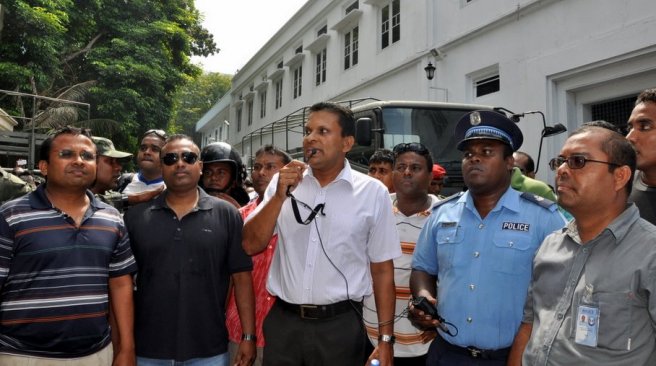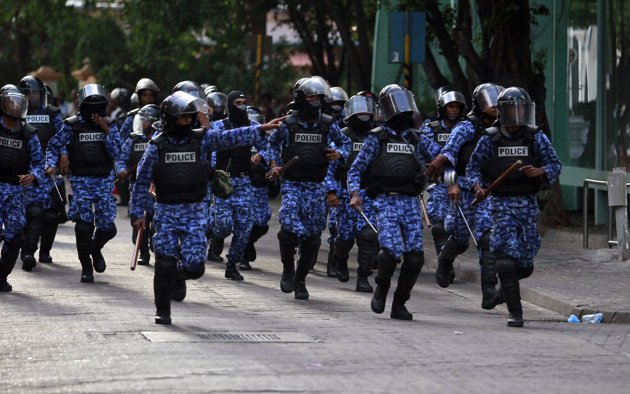This article first appeared on Dhivehisitee. Republished with permission.
On 4 July, 2012, Mohamed Nasheed, President of the Maldives until February 7 that year, testified at the Commission of National Inquiry (CoNI) on how his government came to an end. Present were co-chairs of the Commission Justice Selvam and Ismail Shafeeu, members Dr Ibrahim Yasir, Dr Fawaz Shareef and Ahmed Saeed. Observing for the international community were Sir Bruce Robertson and Professor John Packer.
In essence, my statement is very small… I was forced to resign. I resigned under duress. I was threatened. If I did not resign within a stipulated period it would endanger mine and my family’s life. I understood they were going to harm a number of other citizens, party members. They were going to literally sack the town. I felt that I had no other option, other than to resign.
Despite CoNI being a national inquiry looking into the highly suspicious end of a government elected by the people, all testimonies collected have been kept from the public. Having come into possession of a copy of the transcript of Nasheed’s spoken testimony to CoNI on 4 July, I have summarised its contents and shared it with you here. What is contained here is not Nasheed’s entire testimony that day, but only the parts concerning the last few hours of his presidency. Care has been taken, however, to ensure no information has been taken taken out of context, added, or deleted from the text and to remain faithful to Nasheed’s words as contained in the transcript.
President Mohamed Nasheed arrived at Bandaara Koshi at 5:00 am on 7 February 2012. Operation Liberty Shield was supposedly underway, but the place was almost deserted. About 300 personnel in total, most of them in plainclothes, milled about lethargically. There were several generals present—Chief of Defence Moosa Jaleel, General Shiyam, General Nilam, General Ibrahim Didi. The military HQ was on red alert, but most of the generals looked as if they were on holiday.
From the late evening of 6 February, Nasheed had been busy trying to control the situation from Mulee Aage, his residence. Judging from police behaviour during protests on the preceding days, the President was convinced the police must be removed from the scene. He knew plans were afoot to have his government illegally overthrown in a coup. A week earlier, he received a seven page letter from military intelligence. It outlined in detail a plot to illegally overthrow the government.
Attempting to control the situation on the evening of February 6, he had two major concerns: the police might attack MDP supporters, and they might attack the military. On hindsight, the president would come to see that he could also have arranged for MDP supporters to disperse. Other actions would have led to other consequences. But, at that moment in time, he trusted his supporters to maintain order more than he did the police. He was assured by the MDP MP leading the protests there would be no disruptions.
He ordered the police to be removed and for the military to takeover.
Seven hours later, the military was yet to take any action.
The President felt he must go to the scene. He needed to see for himself, assess what was happening. That is the kind of person he was.
Before he left, he checked with the military personnel inside the headquarters.
“We have the capacity to bring out a 1000 troops,” they assured, beckoning him.
Nasheed walked to the HQ. What he found were the generals who looked as if they were on vacation, and no plan of attack. He had suspected as much. As a history enthusiast, he had studied in detail every coup that took place on the islands in the past 200 years.
He could read the signs, he knew when a coup was brewing.
**********
Inside, Nasheed met with his Home Minister Afeef, Defence Minister Tholhath, and Commissioner of Police Ahmed Faseeh.
“What should I do?” he asked them each individually.
Each replied the police must be restrained, arrested.
Twice, the military advanced only to retreat shortly afterwards. They treated the police with kid-gloves, there was no command. As the situation deteriorated, Nasheed rang the Chief Justice and the Speaker of Parliament. He felt that all organs of the state should be present at such a crisis. Both men agreed to come.
Nasheed also rang various MDP MPs, requesting their help at the scene. And, he made several attempts to contact the Vice President.
“But, of course,” those attempts were futile.
“The Vice President should be behind the President at a time like this,” Nasheed thought. “He should have come on his accord to be here.”
Waheed did not come. Nor did he answer the phone. Perhaps he was asleep? He was still up at 2:00 a.m. in the morning, Nasheed knew. The Vice President had appeared on television then, with a statement on the events.
Incidentally, Nasheed’s wife Laila and Waheed’s wife Ilham shared the same make-up artist. Whatever the whereabouts of Waheed, through his wife’s beautician, Nasheed would later learn that by 7:00 am of 7 February, Ilham was groomed for a special occasion.
In the early hours of 31 January, Waheed had met with the opposition in his home. Nasheed sought him out in the intervening period, but Waheed avoided him. The Vice President provided the President with neither advice nor assistance. When quizzed by Ministers in their government, Waheed refused to share any information about his meeting with the opposition.
Speaker Shahid and Chief Justice Faiz never turned up.
Some MPs did respond to Nasheed’s call for help. From his vantage point inside the military headquarters, Nasheed saw how each were beaten up. The attacks on individuals soon became a barrage, spreading across the entire area. It was to continue for the next two hours.
“In the net”
Inside the headquarters, the President’s phone had very little reception. It was not because the signal was jammed, although it should have been. Jamming the signal and providing him with another phone would have been a good strategy, Nasheed thought. He saw General Shiyam on the phone, sending a constant stream of text messages and receiving many phone calls. “Who but the President should Shiyam be in touch with at that moment in time?” Nasheed wondered.
Despite the bad reception, from time to time, President Nasheed received updates from members of his government and MDP. He heard about MNBC One being under attack. He heard police and military had taken over the airport, had control of the immigration counters.
He also heard Gayoom was up all night, co-ordinating the anti-government efforts from Malaysia. According to reports Nasheed received, on receiving news that he was at the military headquarters Gayoom said, “He is in the net.”
For all intents and purposes, Nasheed was now a captive, falsely imprisoned inside the military headquarters. His security detail, the Special Protection Group [SPG], were guards, not protectors. Their leadership was changed the day before, a man called Rauf replaced the former Chief. Rauf was in charge of protecting the President and his family, but, all day he languished outside the gates. No assurances of safety were forthcoming from him.
**********
Through the course of the next two hours, Nasheed went up and came down several times. He saw MP Mariya Didi being attacked. It was astounding. He saw the Deputy Minister being attacked. He saw other MPs assaulted. He saw the police headquarters being attacked.
[Between 7:00 and 8:00 in the morning] Nasheed went outside to speak to the mutinying police. His Police Commissioner no longer believed they were police, and refused to negotiate with them. Nasheed’s attempt was in vain. He could not agree to their demands for a pardon. It was not that he didn’t have the power or the authority.
“But”, he thought, “who am I to pardon before an investigation?”
Still, he promised them he would do his best for them. His promise went unheeded by the mutineers.
Inside the military HQ, he tried to talk to the soldiers. He had tried to do the same earlier, when he took a walk inside the premises shortly after his arrival. Some of the soldiers were playing chess, he noticed. Before he could conclude his walk, General Shiyam had intercepted him.
“They don’t want you to be walking around here,” the General said. He did not give a reason. It was possible soldiers of lower ranks had been told not to obey the President’s orders.
This time he met with about fifty soldiers from the lower ranks.
“You are taking the country to the dogs. You must do something,” he wanted to tell them.
“My wife is being attacked by MDP supporters,” one of them replied.
“A policeman has been murdered,” said another.
“That is not true. We don’t do that. We are a party in government and we govern,” the President responded.
“Will you come out with me to restrain a rebellious force?” he asked.
“If even 10-20 people agreed, I will lead them out,” the President thought.
Only one of them was willing. The rest said the President should resign.
*********
Nasheed saw police re-enforcements arriving in Male’ on speedboats. The boats belonged to Gasim Ibrahim’s Villa company.
“Strange,” he thought. Never in his position as Commander in Chief had he ordered the security forces to use Gasim’s vessels. All of them were in uniform.
“We will lynch you. We will hang you,” Nasheed heard them. They had ropes.
The violence escalated to a level Nasheed had never imagined he would see in the Maldives.
“I am going to die right now if I don’t resign”, he thought. Naseem [former foreign minister Mohamed Naseem] arrived.
“Mohamed Amin was standing right here when he was lynched,” Nasheed remarked. Amin was the first president of the Maldives. His bloody end in the hands of an angry mob is described in the recently published Orchid, reminding the public afresh of violence past.
Nasheed contemplated his options. He could go out and face the crowd, leave the rest to God.
“Please don’t do that,” Naseem pleaded with Nasheed. The Minister was crying. Both of them had grown up listening to the stories of Amin’s lynching. MP Riyaz joined Naseem’s plea.
“You are being silly. You don’t need to die today. There will be a tomorrow.”
**********
“Back off! We are opening the gate!” the President heard.
Nazim, Riyaz and Fayaz walked into the HQ when the gates, earlier shut under a direct order from the Presdent, were opened. There was no reason for them to be in the building, no capacity in which they could legally enter the premises.
The President knew when Nazim had arrived, he had heard the uproar with which the man’s presence had been greeted. Through the walls of the second floor room in which he was in, the President also heard Nazim address the crowds through a megaphone. He never met Nazim or the other two men inside the military HQ. Nor did he know which part of the building they were in. Once they arrived, Nasheed could not move without being restrained by someone.
“You cannot go there,” General Shiyam said when he tried to go upstairs, to the second wing. The General, whose lack of uniform at a time when the military was on red alert appeared to Nasheed as a sign of desertion, was categorical in his order. He offered no explanation.
“Someone else…someone from the opposition…Nazim? Umar Naseer? Someone was there”, the President would later speculate. “Someone was controlling operations from the other wing of the building.”
Twice the SPG, under new chief Rauf’s command, physically restrained the president. When Nasheed heard about MDP Haruge being ransacked he felt it was his duty to go. Faisal, now a major, held him back. Their excuse was that it was not safe for the president.
They checked his belongings. He had to ask their permission to use the toilet.
“Am I under arrest?” he asked.
Nasheed realised how foolish the question sounded. “I cannot be under arrest”, he thought. “But, of course, I am,” he countered himself.
Jailed several times during Gayoom’s regime for dissent, once detained in solitary confinement for 18 months, the President was familiar with arrest procedures. If he were to use the toilet without permission, they would break in. He had experienced it first hand twice before. His current guards had ‘Forensics’ written all over them.
Among them were faces he could never forget—they belonged to individuals who had interrogated and tortured him before. Soon after Nasheed’s first child was born and while he was expecting his second, one of them had ransacked his home. The man had meticulously gone through every single toy belonging to his young daughter.
“He wants to re-enact that,” Nasheed thought.
He knew these people well. He knew Abdulla Riyaz, was aware of the type of person he is. These people were not searching for anything in specific. The President knew it was an attempt to undress and demoralise him.
“They are trying to make you capitulate,” Nasheed thought. He knew torture and punishment were their preferred tactics.
“People outside are shouting and calling for you to be lynched”, they told him.
“You are going to lynch me from the inside,” he retorted.
**********
The President made the decision to resign at the precise moment he heard the gates ofBan’deyri Koshi being opened. He could hear the din of the baying crowd right outside.
“Mr President, if you don’t resign, they will kill you. They will sack [sic] Male’”, General Ibrahim Didi had told him earlier. The General sincerely believed it was his duty to defend the President with his life. Now, he was failing miserably. Twice the military had advanced and retreated. General Didi, an honourable man, offered to resign. Nasheed observed with concern that it was not beyond the General to contemplate suicide.
“I have only a few minutes to live”, the President now thought. The situation was dire, the country was under threat. Both his life and that of his wife, Laila, were in mortal danger. Laila had no protection in Mulee Aage, she had been forced to leave with their children. He was also convinced MPs Mariya, [Ahmed Easa] and Ibu [Ibrahim Mohamed Solih] had been killed.
But, Nasheed knew it was not safe for him to resign inside the military headquarters. Once the attack on the HQ began, four large bricks were thrown into the second floor room he was in. His precise location was no secret to the attackers outside. The bricks had left large holes in the glass. Shooting into the room through those holes would be easy.
Nasheed was aware there were guns all around him. The generals had guns, he was convinced. Even if the armoury was locked, they had the keys. As Nasheed would later come to understand, guns were moved that day from Coast Guard ships, from other barracks. There are pictures showing some of the movements. He heard KK [Kalhuthukkalaa Koshi] troops were going to join the police in their mutiny. He saw the troops. He heard that when the renegade police and military took over MNBC One earlier, they used guns and were in possession of firearms.
The President knew he must leave the building. He agreed to resign.
“But”, he said, “it would be better if I do not do it from here. I must have fresh clothes, a shave.” He was looking for an escape.
It did not work. His captors had the clothes and toiletries delivered to the HQ.
His resignation speech was to be made at a press conference in the President’s Office shortly.
Resignation: “The biggest rogue letter was written by me.”
Nasheed was taken the short distance to the President’s Office in a car. A large mob, composed not of the public but of police and military personnel, surrounded the car. They were screaming. They were banging on the President’s car. There was no security, no decorum.
Nazim, Riyaz and Fayaz were already at the President’s Office.
“These people should not be here,” he thought.
The President’s staff made several vain attempts to stop the three men. Defying everyone’s wishes and all protocol, they got into the dedicated President-only lift with Nasheed. Within the enclosed space, in the presence of Riyaz and Fayaz, Nazim dictated the words that should be in his resignation letter.
In his office, the President did not put the words on paper. It did not occur to him that he should, for he had never had any intention of resigning. For him, the agreement to resign was a ruse, a way of escaping death and leaving the military headquarters.
“The Speaker wants the letter,” Nazim told him. The President hesitated. He went to the window and looked outside. The situation appeared even worse than before. He looked at Nazim. There was a tell-tale bulge in his trousers.
“He has a gun,” Nasheed was convinced. He would later make out its outlines in a picture of Nazim with his back to the camera, taken after the resignation press conference.
“You cannot back out now. You have to go all the way,” Nazim said. The President knew clearly that his life was under threat, that he would not be allowed to live.
He began writing the letter. Twice he broke down. But he knew that if he did not remain composed, if he did not maintain decorum, there would be chaos. He took care composing the letter, including only the bare minimum of what Nazim had dictated. He would only write enough to keep Nazim happy. It was all an act. Theatre. A lie to save his life.
“The biggest rogue letter was written by me,” Nasheed would say later. He was baffled when Speaker Shahid accepted the letter, it followed none of the required official documentation processes. Nasheed wrote the letter himself. There were no reference numbers, its only nod to officialdom was the emblem on the presidential notepad he used.
Shahid is the type of person who takes pride in receiving letters. Normally, he would have telephoned Nasheed on receipt of the letter. On this day, he was silent. There was no contact. Official documentation rules require proof receipt. No such record exists for President Nasheed’s resignation letter.
Before the press conference, Nazim dictated to him what he should say in his resignation speech.
“Tell the people to keep calm and remain at home. Tell them no one should come out on the streets. Ask Moosa and Mariya to remain silent. Tell other party members not to say anything. Don’t say anything about me. You must say nothing about duress. Say that you are doing it of your own accord. Of your own free will,” Nazim dictated to Nasheed.
As with the letter, Nasheed did not say what Nazim wanted. Instead, he took Nazim’s ideas and polished them up and said the bare minimum needed to save his life and country. He did not state that he was resigning of his own free will. He did not include any instructions for Moosa Manik, Mariya Didi or anyone else to stay at home.
For Nasheed resigning was not the best option. It was the only option.
Dr Azra Naseem has a PhD in International Relations
All comment pieces are the sole view of the author and do not reflect the editorial policy of Minivan News. If you would like to write an opinion piece, please send proposals to [email protected]
Likes (2)Dislikes
(2)Dislikes (0)
(0) 
